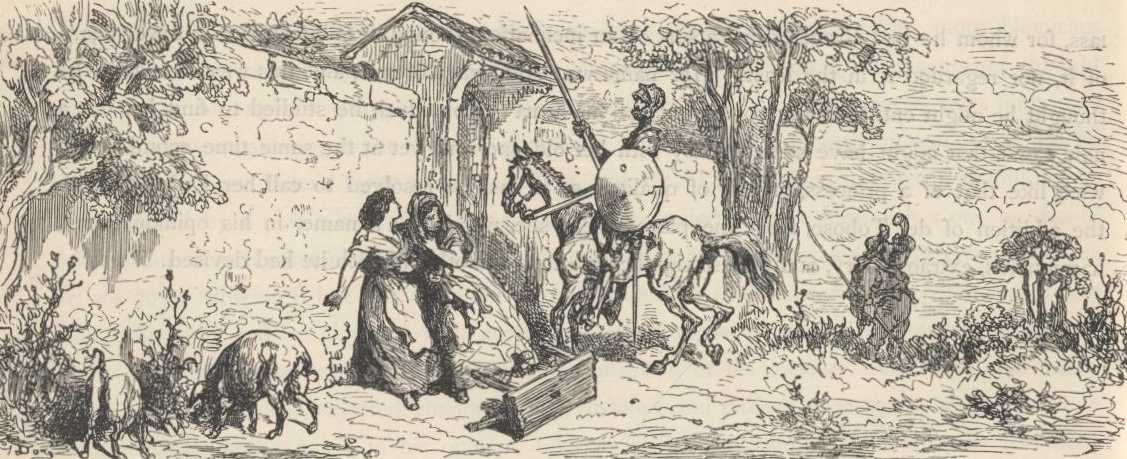These preliminaries settled, he did not care to put off any longer the execution of his design, urged on to it by the thought of all the world was losing by his delay, seeing what wrongs he intended to right, grievances to redress, injustices to repair, abuses to remove, and duties to discharge. So, without giving notice of his intention to anyone, and without anybody seeing him, one morning before the dawning of the day (which was one of the hottest of the month of July) he donned his suit of armour, mounted Rocinante with his patched-up helmet on, braced his buckler, took his lance, and by the back door of the yard sallied forth upon the plain in the highest contentment and satisfaction at seeing with what ease he had made a beginning with his grand purpose. But scarcely did he find himself upon the open plain, when a terrible thought struck him, one all but enough to make him abandon the enterprise at the very outset. It occurred to him that he had not been dubbed a knight, and that according to the law of chivalry he neither could nor ought to bear arms against any knight; and that even if he had been, still he ought, as a novice knight, to wear white armour, without a device upon the shield until by his prowess he had earned one. These reflections made him waver in his purpose, but his craze being stronger than any reasoning, he made up his mind to have himself dubbed a knight by the first one he came across, following the example of others in the same case, as he had read in the books that brought him to this pass. As for white armour, he resolved, on the first opportunity, to scour his until it was whiter than an ermine; and so comforting himself he pursued his way, taking that which his horse chose, for in this he believed lay the essence of adventures.
Thus setting out, our new-fledged adventurer paced along, talking to himself and saying, “Who knows but that in time to come, when the veracious history of my famous deeds is made known, the sage who writes it, when he has to set forth my first sally in the early morning, will do it after this fashion? ‘Scarce had the rubicund Apollo spread o’er the face of the broad spacious earth the golden threads of his bright hair, scarce had the little birds of painted plumage attuned their notes to hail with dulcet and mellifluous harmony the coming of the rosy Dawn, that, deserting the soft couch of her jealous spouse, was appearing to mortals at the gates and balconies of the Manchegan horizon, when the renowned knight Don Quixote of La Mancha, quitting the lazy down, mounted his celebrated steed Rocinante and began to traverse the ancient and famous Campo de Montiel;’” which in fact he was actually traversing. “Happy the age, happy the time,” he continued, “in which shall be made known my deeds of fame, worthy to be moulded in brass, carved in marble, limned in pictures, for a memorial for ever. And thou, O sage magician, whoever thou art, to whom it shall fall to be the chronicler of this wondrous history, forget not, I entreat thee, my good Rocinante, the constant companion of my ways and wanderings.” Presently he broke out again, as if he were love-stricken in earnest, “O Princess Dulcinea, lady of this captive heart, a grievous wrong hast thou done me to drive me forth with scorn, and with inexorable obduracy banish me from the presence of thy beauty. O lady, deign to hold in remembrance this heart, thy vassal, that thus in anguish pines for love of thee.”
So he went on stringing together these and other absurdities, all in the style of those his books had taught him, imitating their language as well as he could; and all the while he rode so slowly and the sun mounted so rapidly and with such fervour that it was enough to melt his brains if he had any. Nearly all day he travelled without anything remarkable happening to him, at which he was in despair, for he was anxious to encounter someone at once upon whom to try the might of his strong arm.
